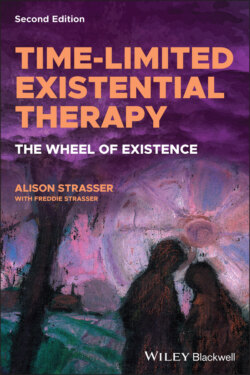Читать книгу Time-Limited Existential Therapy - Alison Strasser - Страница 16
The Ontological Givens
ОглавлениеRelationship in the ontological sense describes how a human being is always in a state of relationship not only to others but also to oneself and to the overall culture and environment. This understanding does not make any statements about the quality or the nature of the relationship but simply states the fact that relatedness reveals itself in the relationship.
Facticity relates to the limiting factors that we cannot fundamentally change including certain features such as our own genetic makeup, our psychological profile, our cultural heritage, and our social world.
Uncertainty and inconsistency is a feature of life that we cannot avoid and which the world imposes upon us.
Temporality ‘is the name of the way in which Time exists in human existence’ (Warnock, 1970, p. 62) and nobody can escape from the idea that life is moulded by our finitude, that we are only transitory beings on this planet.
Mood is the way we are ‘attuned’ to the world and describes how we are both experiencing and responding to our existence. ‘A mood assails us. It comes neither from “without” nor from “within”, but arises from Being‐in‐the‐world, as a way of that being’ (Heidegger, 1962, p. 136).
Freedom is connected to responsibility in that humans are not determined by external factors which are certain, but, within the limitations of existence, are free to create their own responses to living.
Embodiment denotes the concept that humans are both physical and non‐physical, are both mind and body. A body–mind experience will both shape and be shaped by our interactions in the world. ‘We are both subject and object, where the subject is his body, his world, and his situation, by a sort of exchange’ (Merleau‐Ponty, 1964, p. 72), where the object is subsumed into this exchange.
Mortality is our constant awareness that we are moving towards death, the end of our known life. It is our ultimate limitation, which cannot be removed, only denied or engaged with.
Anxiety is that state that is constantly in our background revealing to us both our discomfort and excitements generated by aspects of being human, such as the choices that seem out of our control, our moving towards death and our freedom.
Choice is inevitable in that we are constantly making choices, even when we are unaware of doing so. Even choosing not to choose is a choice.
Engagement (or Action) is how we choose to participate with the world, whether fully, partially, half‐heartedly, with passion and so on. Closely linked to our values, the idea of engagement also indicates our authenticity.
This ontological space is where we share a common resonance with other human beings about all that it is to be human, in a world that is replete with both limitations and possibilities.
It is also the space that, as therapists, we share with our clients in that we too are travelling on a journey through life’s tribulations, despairs and joys, in search of meaning within lives without inherent meaning and living with all of life’s paradoxes – all part of the process of coming to terms with living and dying. Ontology also facilitates our mutual caring or concern, which Heidegger describes as interconnectedness with others.
In practice, our exploration of ontological concerns merely reflects our innate sense of what it is to be a human being and doesn’t describe our personal response to these givens. Although the ‘givens’ described above may be immutable, the way we perceive or interpret them and the attitude we take towards them is always open to interpretation.
